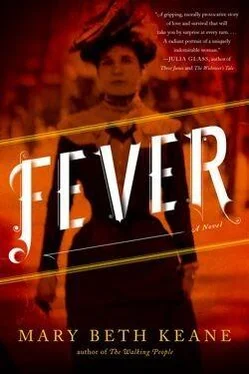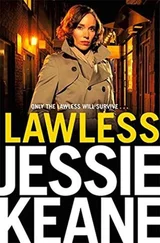“I’m just feeling poorly. Come around in a few days.”
“Can I bring you something? Have you eaten?”
But Driscoll only moved closer to the wall.
“I’ll check on you tomorrow,” he said, and when Driscoll didn’t respond, Alfred left. He stood at the bottom of the stairwell for a minute, tempted to go up to see Mary, but he’d be back the next day and between now and then maybe he’d think of the perfect thing to say.
Alfred arrived home in time for a nearly silent supper with Liza and Samuel. In the morning, he decided he couldn’t go another day without seeing Mary, and once he’d decided, he had no patience for being at the stable, alone with the horses. Now that the weather was cold, the demand for ice was way down, as was the supply until the winter harvest. The trucks went out every day, but mostly to businesses, a few blocks here and there to the rich houses that didn’t care to keep their milk or butter on the window ledge like Mary had always done, and Liza did now, but preferred to serve ice in glasses to their guests, even in the winter months. Lately Alfred had felt that pinch that told him he would not last there for much longer. He would have to find something else. Ten blocks north was a stable the ice company rented to the Department of Health, and that was more interesting. On quiet afternoons Alfred walked up there with the ready excuse that he was still concerning himself with company property. When he first started at the stable he didn’t understand why the Department of Health needed so many horses. Whenever a horse got too old to haul an ice truck, or was too difficult to drive through the city, the men at his stable always said that the Department of Health would take it, and now Alfred said it too, but he didn’t know why until one day, a bright autumn afternoon, he walked the ten blocks to distract himself and when he got to the stable he saw that the large side room that used to be a dairy, back when the city had cows, had been turned into a slaughterhouse for horses. There were two horses up on slings with gashes in their necks and a glass instrument stuck in each bloody wound. Below the horses’ mighty bellies were lined up rows and rows of buckets where blood had been collected, and all around were men in white lab coats.
“Out!” one yelled when he saw Alfred. The man was crouching beside the larger of the two horses, checking the glass tube, and when he scrambled up to shoo away Alfred he slipped on a small spot of blood on the floor, knocking over a full bucket as he tried to right himself. The other men cursed and glared at Alfred. The horses, who were still alive, each turned a wild, terrified eye to Alfred, and seemed to understand that he was the only one in the room who might help them.
“Jesus Christ,” Alfred said when he got back out to the glare of the street, the flies in front of the stable door frantic with the smell of blood. He passed through the other door to the stable proper, where there were a dozen horses munching on hay as if they were out at pasture. “What are they doing?” Alfred asked the boy who was sitting on an upturned bucket in the corner, reading an old newspaper.
“Bleeding,” the boy said, and simply turned the page.
Later, when he and Samuel were elbow to elbow at the table waiting for Liza to spoon out their supper, it was Samuel who told him what he’d probably seen, that the horses were being bled for their serum, which would be used to make inoculations against disease. “Diphtheria, probably,” the boy said. “I read about that. Or Typhoid, maybe. They’re working on something.”
“Come on. Horse blood?”
“Horse serum. They inject the horse with the disease and wait for the horse to develop the means to fight it and then they take out the blood and whittle it down to the fighting parts and then they put that in an injection and give it to people. Didn’t you ever wonder what’s in the shots people get?” The boy leaned back in his chair and regarded Alfred.
Alfred was ashamed to say he had not ever wondered what was in an injection. Before seeing Dr. Oppenheimer he’d never gotten an injection in his life, and now he wondered what the doctor was putting in him. There was witchcraft in the old country, but nothing this dark, as far as Alfred could remember. Certain herbs and weeds. A way of mixing. Poultices smeared on chests, aromatic flowers ground down to powders and stirred up into tea. But this horse-blood business seemed like more sinister magic. Liza had turned from the stove to listen to her son, and now, understanding that her boy was finished explaining, she turned back to her saucepan of gravy, her cheeks spotted with pride and pleasure.
Now, the day yawning before him until it was time to sign out and walk over to Thirty-Third Street, he considered going up to the DOH stables to pass the time. Instead, he signed himself out for five o’clock, even though it was only two.
• • •
Driscoll was not better. Alfred opened the man’s door slowly, and knew immediately by the silence and the cold kitchen that he was still in bed. He found Driscoll in the same position, and when Alfred put his hand on the back of his neck it felt like a furnace, and Driscoll moaned. “Should I get you something?” Alfred asked, feeling like a big, hulking, useless thing that was too stupid to know how to help. He went to the kitchen and ran a dishcloth under cold water. He brought it back to the bed, laid it across the old man’s head, and then worried as he saw the sheets darken where the wet touched them. Driscoll shifted away. “You need help, I think,” Alfred said, more to himself than to the old man. A doctor. But he’d never called on a doctor before.
He could have knocked on Fran’s door, or gone up to confer with Jimmy Tiernan, but he marched on past the second-floor landing, past the third. He needed Mary. The elderly sisters who also lived on the fourth floor had their door cracked for air and Alfred knew he could stop and ask them. He’d seen Driscoll talk to them from time to time, and when one of them injured her knee Driscoll had gone up there with a baked cod on a platter because they couldn’t get out. But instead of stopping, Alfred kept going to the Borriellos’ door and drew a breath. If Mrs. Borriello answered, he’d have to speak up, speak slowly, and then everyone would hear and his whole reason for going up there would be confused. Because he was really going up there for Driscoll. And if it ended up that he and Mary would start talking again because of it, fine, as long as Driscoll improved.
The younger boy answered, and when he saw who it was his eyes went wide.
“Is Mary here?”
The boy raised a finger to Alfred and then shut the door. Alfred heard movement inside, a chair pushed back along the wood floor.
When the door opened again it was Mrs. Borriello. The boy peeked at him from behind his mother. “Yes?” she said.
“I’m looking for Mary. I understand she’s been staying here?”
“Why?”
Alfred felt himself getting annoyed. “Mr. Driscoll isn’t well, and I thought Mary would know what to do.”
“Sick?” Mrs. Borriello said.
“Yes. Since yesterday. Maybe longer. Is Mary here?”
But Mrs. Borriello was already gathering her scarf. She said something to the boy before slipping past Alfred and down the stairs to Michael Driscoll’s door. The boy regarded Alfred from the door frame. “She doesn’t get home until later.”
“Yeah? Are you in charge of her schedule?”
“No. I’m in charge of the lamp. I bring it back to the kitchen when she gets home from the laundry and we do our figures at the table while she’s eating. My brother and me, I mean. Then when she’s done I take it back to my room. My mother says it’s our lamp, not hers, but we have to let her borrow it to eat by because it’s not right to ask a person to eat in the dark when there’s a good lamp a room away.”
Читать дальше












